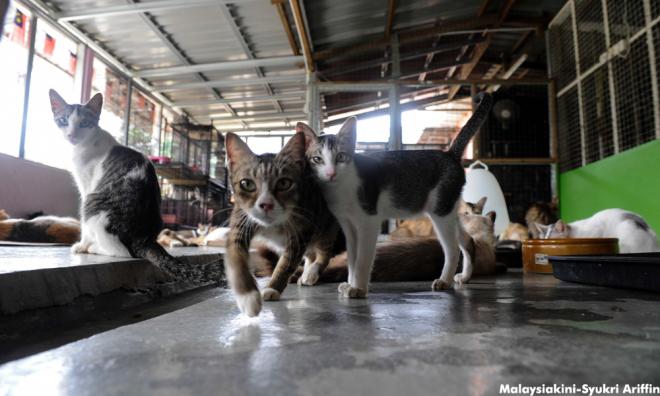
CORONAVIRUS | Cat owners should not be alarmed over a study which found that felines were susceptible to Covid-19 in high doses.
Quoting Ohio State University virologist Linda Saif, Nature reported this is because the lab experiments involved deliberately infecting the cats with a high dose of the virus that causes the disease and do not reflect real-life interactions between humans and their pets.
She said there is no direct evidence that infected cats secreted enough of the virus to infect people.
She was responding to a preliminary report published by a team of researchers at the Harbin Veterinary Research Institute and China's National High Containment Laboratory for Animal Diseases Control and Prevention on Tuesday.
The report - which has yet to be peer-reviewed - described a series of experiments where animals were exposed to the virus and then examined a few days later.
In addition, three infected cats had been kept in cages next to three uninfected cats to see if the latter group caught the disease. One of the cats did become infected.
“We found that SARS-CoV-2 (the virus that causes Covid-19) replicates poorly in dogs, pigs, chickens and ducks but efficiently in ferrets and cats.
“We found that the virus transmits in cats via respiratory droplets,” the report said.
The researchers urged that testing cats for Covid-19 should be part of efforts to eliminate the disease in humans.
However, Saif noted that none of the cats showed symptoms and only one in three caught the disease after being exposed to an infected cat.
“This suggests the virus may not be highly transmissible in cats,” she added.
Saif said the mode of transmission is still unclear because the study report did not describe how the cats' cages had been set up and the uninfected cats could have contracted the virus from contaminated faeces or urine.
She argued that more tests are needed, including some in which cats are given different doses of the virus to see if it can still pass on the disease.
The Nature report also quoted City University of Hong Kong epidemiologist Dirk Pfeiffer saying that the results showed that cats should be considered in efforts to combat Covid-19 but are not a major factor in the spread of the disease.
“The focus in the control of Covid-19 therefore undoubtedly needs to remain firmly on reducing the risk of human-to-human transmission,” he added.
As for dogs, the researchers in Harbin reported that five dogs were inoculated with the virus. Of these, two excreted viral RNA in their faeces but none of the samples contained infectious viral particles.
Separately, Ontario Veterinary College professor Scott Weese said the researchers’ findings are not surprising but increased the urgency in examining the extent that infections take place in real-world scenarios.
“It was a very small transmission study so we need to see if more data come from other studies. The dog results are encouraging and support a low risk of infection of, and from, dogs.
“Ferrets and cats remain our main focus, both in terms of keeping infected people away from them (so the animals don’t get infected) and keeping exposed animals away from unexposed people.
“In a household with a person with Covid-19, the risk to others in the household is mainly from that person. However, we want to make sure pets can’t track it out of the household if people don’t recognise the potential for animal infection.
“The impact of this is completely unknown, but it makes sense to take simple steps to reduce exposure of pets and keep exposed pets away from others,” he wrote on the blog of the Centre for Public Health and Zoonoses in Ontario.
Previously, there had been two reports of pet dogs in Hong Kong testing positive for Covid-19 but both did not show any signs of illness.
It was initially believed the dogs picked up the virus from its surroundings after their owners became infected, without becoming infected by the virus themselves. One of them - an elderly Pomeranian that had tested “weak positive” at first - died of unknown causes shortly after being released from quarantine.
On March 26, however, the Hong Kong Agriculture, Fisheries and Conservation Department said subsequent tests on the Pomeranian's blood samples confirmed that the dog had an immune response to the virus, meaning that an infection had indeed taken place.
It cautioned that such cases are rare and showed that pets are not easily infected and there was yet to be evidence that they played a role in spreading the disease.
It said pet owners should practice good hygiene and sick people should avoid handling animals. Under no circumstances should pet owners abandon their pets.
More recently on March 27, it was reported that a cat in Belgium had tested positive for Covid-19 after its owner became infected.
It began showing symptoms including diarrhoea, vomiting, and breathing difficulties about a week after the owner did.
Previously, an analysis of the proteins involved in Covid-19 infection predicted that the virus could bind to certain pig, ferret, cat, orangutan, monkey, and human cells with “similar efficiencies”. The binding is a key step in starting a viral infection.
The analysis published in the Journal of Virology on March 17 said this is because the protein targeted by the virus is identical or similar enough across these species. - Mkini


No comments:
Post a Comment
Note: Only a member of this blog may post a comment.